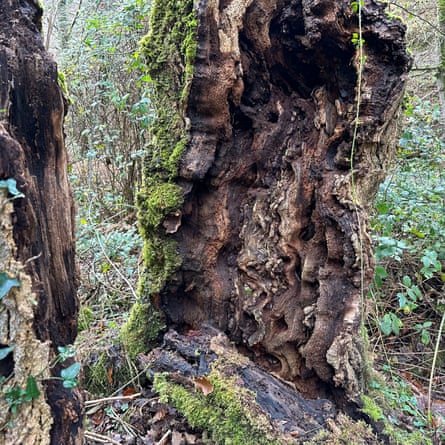Country diary: Time has turned this tree trunk soft as trifle sponge

Horner Woods, Somerset: During the holidays I went in search of an old acquaintance by the side of a tumbling river
Three years ago, in May, when the wood rang with birdsong, I photographed an old ash tree growing at the side of Horner Water. It was a stump with two broken forks, but its moss-furred trunk was firm and thickly rooted, drawing the earth to it. New branches, the width of a child’s arm, sprouted from the bole and waved green fingers.
I sought it out again during the Christmas holidays, when the wood was greyed by midwinter and the only sound was the regular muffled bump of a boulder rocking deep in the tumbling stream.

At first, I couldn’t find it. There was the ivied oak, the low scramble of blackberry, the understory of hawthorn and hazel stripped bare of the spring gauze I remembered. Surely the ash couldn’t be that modest dead tree at the side of the clearing? It seemed so diminished, ebbing out of itself into the soil.
A good third of the trunk had collapsed on the ground where it lay, soft-soaked as trifle sponge. Minute orange blobs of pin-head fungi glowed against the blackened bark like a sprinkling of sherbet pips. The tree was riven where the years had passed through.

The fall had exposed its hollow trunk, which was rippled inside like hair, or like the water that grunted and chuckled a couple of metres away. The newer branches were dead too, their vigour choked by decay below.
I walked away, kicking up coracles of wet leaves. Something bright caught my eye: a fat bead the colour of apricot jam welded to a leaf. It was an oak marble gall, formed by larvae of the Andricus kollari wasp, a Mediterranean species. These insects were introduced to the UK in the 19th century because their galls have a particularly high tannin content, helpful in the process of tanning leather.
The gall was a reminder that these woods, now so tranquil, were once an industrial workplace. They produced bark for leather-making and charcoal for smelting the iron ore that was mined in the pits nearby. The noise of the hammer mill would have echoed down the combe along with the voices of dozens of people who lived here.


